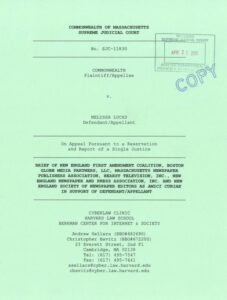 On Tuesday, the Cyberlaw Clinic filed an amicus brief (PDF) in the Supreme Judicial Court of Massachusetts on behalf of the New England First Amendment Coalition, Boston Globe Media Partners, LLC (owners of the Boston Globe), Hearst Television, Inc. (owners of WCVB-TV Channel 5 in Boston), the Massachusetts Newspaper Publishers Association, the New England Newspaper and Press Association, Inc., and the New England Society of Newspaper Editors in Commonwealth v. Lucas, SJC-11830. The case was brought under the Massachusetts false campaign speech law, M.G.L. ch. 56 § 42 (“Section 42”). The defendant in the case, a treasurer with a political action committee that sent a mailer in the 2014 state election, challenged the constitutionality of the statute under the First Amendment and Article 16 of the Massachusetts Declaration of Rights.
On Tuesday, the Cyberlaw Clinic filed an amicus brief (PDF) in the Supreme Judicial Court of Massachusetts on behalf of the New England First Amendment Coalition, Boston Globe Media Partners, LLC (owners of the Boston Globe), Hearst Television, Inc. (owners of WCVB-TV Channel 5 in Boston), the Massachusetts Newspaper Publishers Association, the New England Newspaper and Press Association, Inc., and the New England Society of Newspaper Editors in Commonwealth v. Lucas, SJC-11830. The case was brought under the Massachusetts false campaign speech law, M.G.L. ch. 56 § 42 (“Section 42”). The defendant in the case, a treasurer with a political action committee that sent a mailer in the 2014 state election, challenged the constitutionality of the statute under the First Amendment and Article 16 of the Massachusetts Declaration of Rights.
The brief argues that Section 42 is an unconstitutional restriction on the content of speech, and is also unconstitutionally vague. The brief describes the robust protection for speech in the realm of political debate, and notes several cases in other jurisdictions where courts struck false campaign speech statutes. As those cases note, counterspeech by political opponents is the preferred way to remedy misleading political speech, and statutes that criminalize false speech for the sake of protecting listeners are usually instead used as tools to extract partisan revenge by filing frivolous criminal complaints.
As the brief notes, Section 42 presents more serious concerns than the statutes in those cases, as it criminalizes the making or publishing of “any false statement in relation to any candidate for nomination or election to public office, which is designed or tends to aid or to injure or defeat such candidate.” Thus, Section 42, “potentially ascribes liability to publishers of third-party information, even when the public well understands that they are not the originators of that speech.” The statute could also criminalize statements that are technically false but are not misleading or fraudulent, including rhetorical hyperbole, satire, false statements published in the process of debunking them, or statements made in covering both sides of a controversial story.
The case is scheduled for argument on Thursday, May 7th, at the John Adams Courthouse in Boston. Special thanks to HLS Cyberlaw Clinic students Catherine Essig (’16), Naomi Gilens (’16), and D. Patrick Knoth (’16), who worked closely with Andy Sellars and Chris Bavitz, along with amici, to prepare and file the brief.
